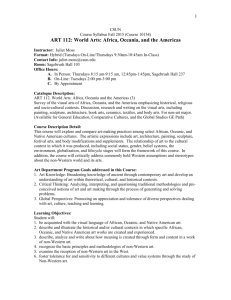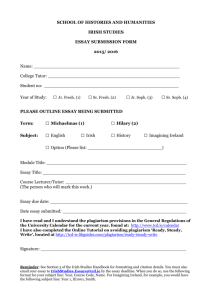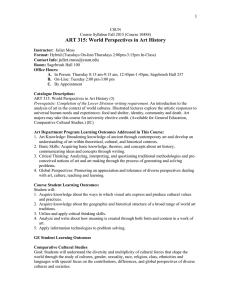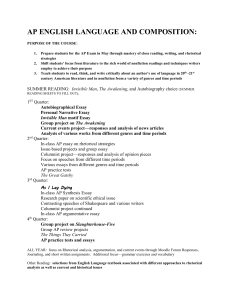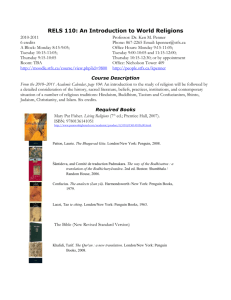Week 4 Africa - California State University, Northridge
advertisement
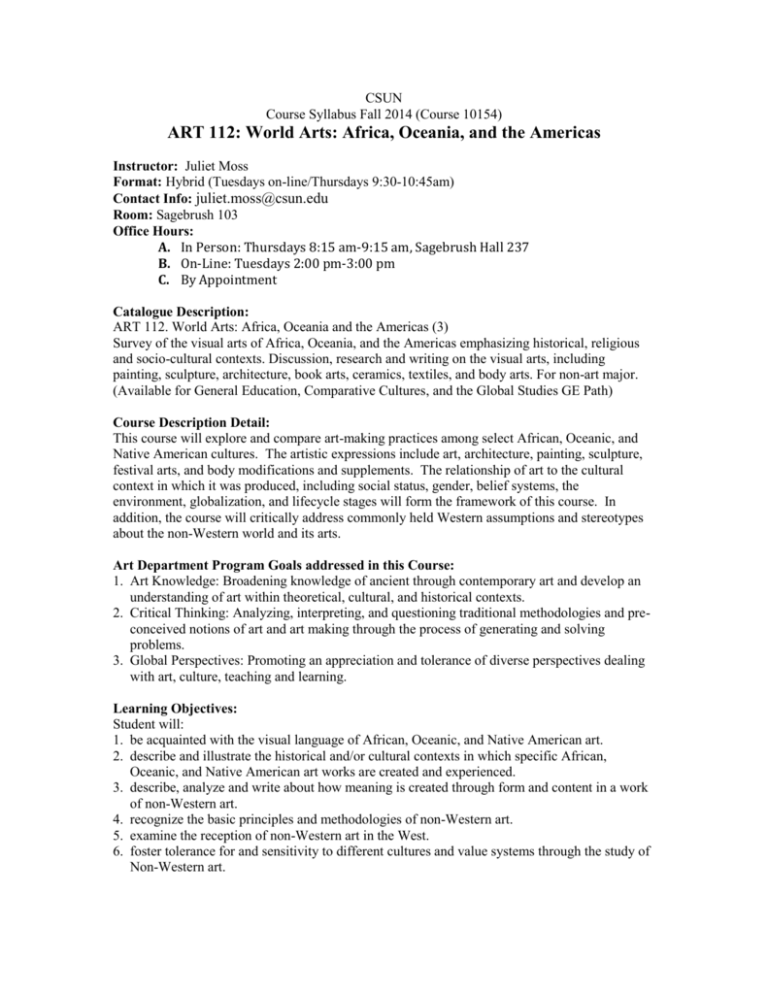
CSUN Course Syllabus Fall 2014 (Course 10154) ART 112: World Arts: Africa, Oceania, and the Americas Instructor: Juliet Moss Format: Hybrid (Tuesdays on-line/Thursdays 9:30-10:45am) Contact Info: juliet.moss@csun.edu Room: Sagebrush 103 Office Hours: A. In Person: Thursdays 8:15 am-9:15 am, Sagebrush Hall 237 B. On-Line: Tuesdays 2:00 pm-3:00 pm C. By Appointment Catalogue Description: ART 112. World Arts: Africa, Oceania and the Americas (3) Survey of the visual arts of Africa, Oceania, and the Americas emphasizing historical, religious and socio-cultural contexts. Discussion, research and writing on the visual arts, including painting, sculpture, architecture, book arts, ceramics, textiles, and body arts. For non-art major. (Available for General Education, Comparative Cultures, and the Global Studies GE Path) Course Description Detail: This course will explore and compare art-making practices among select African, Oceanic, and Native American cultures. The artistic expressions include art, architecture, painting, sculpture, festival arts, and body modifications and supplements. The relationship of art to the cultural context in which it was produced, including social status, gender, belief systems, the environment, globalization, and lifecycle stages will form the framework of this course. In addition, the course will critically address commonly held Western assumptions and stereotypes about the non-Western world and its arts. Art Department Program Goals addressed in this Course: 1. Art Knowledge: Broadening knowledge of ancient through contemporary art and develop an understanding of art within theoretical, cultural, and historical contexts. 2. Critical Thinking: Analyzing, interpreting, and questioning traditional methodologies and preconceived notions of art and art making through the process of generating and solving problems. 3. Global Perspectives: Promoting an appreciation and tolerance of diverse perspectives dealing with art, culture, teaching and learning. Learning Objectives: Student will: 1. be acquainted with the visual language of African, Oceanic, and Native American art. 2. describe and illustrate the historical and/or cultural contexts in which specific African, Oceanic, and Native American art works are created and experienced. 3. describe, analyze and write about how meaning is created through form and content in a work of non-Western art. 4. recognize the basic principles and methodologies of non-Western art. 5. examine the reception of non-Western art in the West. 6. foster tolerance for and sensitivity to different cultures and value systems through the study of Non-Western art. Global Studies, GE Path Objectives addressed in this Course: 1. Students will be able to recognize a variety of globalized political, economic, socio-cultural, and aesthetic forms. 2. Students will be able to discuss the political, economic, socio-cultural and/or historical underpinnings of globalization. 3. Students will be able to analyze the diverse consequences of globalization including its impacts on various social formations (e.g. identity, culture, art, communities, media, markets, nation-states, among other examples) and/or the environment. GE Student Learning Outcomes (Comparative Cultures) 1. Describe and compare different cultures. 2. Explain how various cultures contribute to the development of our multicultural world. 3. Describe and explain how race, ethnicity, class, gender, religion sexuality, and other markers of social identity impact life experiences and social relations. Moodle: Welcome to Moodle, our learning management system! Moodle will work in any modern web browser. Your browser should have both cookies and JavaScript enabled. Browsers: Firefox 3 (or later); Google Chrome 11 (or later); MS Internet Explorer 7 (or later); Safari 4 (or later). Most of you will find our class Moodle site fairly straight forward. However, I suggest you watch one of the following tutorials to be sure you understand how Moodle 2 works. The first requires your user name and login to access a series of video tutorials: https://centralstationu.calstate.edu/moodle/students/ http://www.csun.edu/it/student-moodle-help Readings: Readings are located through Course Reserves on the library homepage as electronic readings. Our course password is 6702. Our readings are shared with other sections of ART 112. To access the readings, go to the CSUN library homepage, click on the ‘reserves’ button, type in ‘ART 112,’ click on the article that you want to read, click on ‘access electronic reserve item’, then enter your webmail ID and password and the course password (6702). All readings are required and should be completed before our classroom meetings. You will be best prepared if you read each article three times and several days before assignments are due. Assessment and Evaluation: Attendance and Participation - 15 points Research Paper/Creative Project - 45 points Discussion Questions (10 @ 5 points each) - 50 points Exams (3 @ 30 points each) - 90 points Grades are based on a total of 200 points for attendance and participation, presentation, research paper/creative project, writing assignments, and exams. A maximum of 215 points are possible with 3 extra credit assignments. A=200-185 A-=184-180 B+=179-173 B=172-165 B-=164-160 C+=159-153 C=152-145 C-=144-140 D+=139-133 D=132-125 D-=124-120 F= 119-0 Attendance and Participation: Attendance is a vital component of this course. A great deal of information will be presented during in class lectures that will show up on the exams, so attendance is extremely important. If you have an emergency and cannot attend, please alert me via email ahead of time. In addition, late arrival to, or early departure from, class can be disruptive so please alert me via email ahead of time if you need to arrive late or depart early. Three instances of unexcused tardiness or early departure will result in the loss of one point. Research Paper/Creative Project: We will go over the paper assignment/creative project and expectations in class. The paper/project is due in the Moodle folder on December 4th by 8pm. NO LATE PAPERS/PROJECTS. A late paper/project is only accepted under emergency situation if I am notified in advance and it will be graded down 10 points for each day it is late. Discussion Questions: You are required to write essays where you will be asked to verbalize your thoughts and ideas about lecture and reading material. There will be 10 discussion questions this semester. Essays are graded on content, organization, grammar, style, and spelling. Be sure that you answer the question asked in its entirety and be sure to proofread your answer. Discussion questions are due on Tuesdays by 8pm in Moodle and there are no make-ups. Essay grades are based on a scale of 1-5 points: 5 is the equivalent of an A and represents a polished, well-written, thoughtful, and thorough response. 4 is the equivalent of a B and represents a good essay that demonstrates strong knowledge of the subject but has some minor flaws either in content and/or grammar. 3 is the equivalent of a C and represents an essay that displays weakness in several areas or only partially answers the question. 2 is the equivalent of a D and represents little understanding of the material or the assignment with major flaws in content and/or grammar. Exams: There will be 3 exams that will test your understanding of class lecture and readings and your ability to interpret the material you have studied. The exams will consist of multiple choice questions, term identification, and short answer essays. Late Work: Late work will NOT be graded. A late assignment is only accepted under emergency situations if I am notified in advance and it will be graded down 10 points for each day it is late. Written Work: Your written work should improve throughout the semester and your grades for discussion essays and the research paper will be based on the following: - Responsiveness to the assignment, clearly demonstrating that you have read and understood the material - Use of explanation and specific detail to support and clarify your claims - Standard grammar, punctuation, spelling and English usage - References cited properly using either MLA or Chicago Style formatting - Free of plagiarism. Plagiarism is defined as taking and using the thoughts and writings of another person as if they were your own. This includes plagiarizing another student from this or a previous semester, a website, museum brochure or any other written material. The copying of more than four or five words in a row without citing the source is considered plagiarism. If I discover ANY use of plagiarism, even if it is only one sentence, you will receive a zero for that essay. You will not be able to make up the essay. Further plagiarism will lead to an F for the course and notification of the University. English as a Second Language: All essays must be in good, standard English and free of grammatical issues. If English is not your first language, I suggest working closely with The Writing Center in SB408 (7-2033) and finding at least two outside proofreaders (whose command of the English language you admire) to look over your work before you submit it. Students with Disabilities: If you have a disability and need accommodations, please register with the Disability Resources and Educational Services (DRES) office or the National Center on Deafness (NCOD). The DRES office is located in Bayramian Hall, room 110 and can be reached at (818) 677-2684. NCOD is located on Bertrand Street in Jeanne Chisholm Hall and can be reached at (818) 677-2611. Students with disabilities who wish to request accommodations should discuss these requests with the instructor as early as possible. Course Outline Week 1 Course Overview, Introduction to African Art Aug 26 (on-line) - Print out and read this syllabus. This syllabus will be your weekly map for the class so study it carefully. Look over the assignments dates and times, reading and writing requirements, and course material. Be sure that this course is right for you and that you will be able to successfully complete it. Hybrid classes require a great deal of personal motivation, discipline, and time commitment. Do not allow yourself to fall behind. Aug 28 (in-class): Introduction to African Art - Read Chapter 1: Art and the Artist in the Non-West and Chapter 2: Introduction to the Arts of Africa Week 2 Africa Sept 2 (on-line): Write “Personal Introduction” essay. Not graded (essays are always due by 8pm on designated Tuesdays in Moodle) -Read Chapter 3: Art and Social Status, Asante, Ghana Sept 4 (in-class) The Royal Arts of the Asante -Watch two short YouTube videos (quick search: yaa asantewa): http://www.youtube.com/watch?v=rzRooY04SHM&mode=related&search= http://www.youtube.com/watch?v=20VCD406XZc&mode=related&search Week 3 Africa Sept 9 (on-line): Essay #1 due -Read Chapter 4: Art and Globalization: Ndebele, South Africa Sept 11 (in-class) Mural Art and Beadwork of the Ndebele Week 4 Africa Sept 16 (on-line): Essay #2 due -Read Chapter 5: Masquerade and Initiation: The Mende Sande Society, Sierra Leone Sept 18 (in-class): Masking Among the Mende Week 5 Africa Sept 23 (on-line): Essay #3 due -Read Chapter 7: Art and Kingship: The Luba Culture, Democratic Republic of Congo Sept 25 (in-class): Art and Kingship in Luba Culture Week 6 Africa Sept 30 (on-line): Essay #4 due Oct 2 (in-class): Africa Exam Week 7 Oceania Oct 7 (on-line): Read Chapters 8, 9, and 10: Introduction to the Arts of Polynesia, Art and the Belief System in Hawaii, and Samoan Tatatu Oct 9 (in-class): Introduction to Polynesian Art: Mana, Tapu, and Art Production -Extra Credit #1 due Week 8 Oceania Oct 14 (on-line): Essay #5 due -Read Chapter 11: Carving Wood and Skin, Maori, New Zealand Oct 16 (in-class): The Art of Carving among the Maori Week 9 Oceania Oct 21 (on-line): Essay #6 due -Read Chapter 12: Art and the Environment, Rapanui, Easter Island Oct 23 (in-class): Art and Environment on Easter Island Week 10 Oceania Oct 28 (on-line): Essay #7 due Oct 30 (in-class): Oceania Exam Week 11 Native America Nov 4 (on-line): Read Chapters 13 and 14: Introduction to the Indigenous Arts of the Americas and Architecture and the Cosmos, Aztec, Mexico Nov 6 (in-class): Architecture and the Cosmos: The Art of the Aztecs -Extra Credit #2 due Week 12 Native America Nov 11: Veteran’s Day Holiday Nov 13 (in-class): Stonework and State Control: The Art of the Inka -Read Chapter 15: Art and State Control, Inka, South America -Essay #8 due Week 13 Native America Nov 18 (on-line): Essay #9 due -Read Chapter 16: Style, Form, and Meaning in the Northwest Coast, North America Nov 20 (in-class): The Art of Giving in the Northwest Coast Week 14: Thanksgiving Break (November 24-30) Week 15 Native America Dec 2 (on-line): Essay #10 due -Read Chapter 17: Art and Commodification, Pueblo and Navajo, North America Dec 4 (in-class): Art and Appropriation: The Pueblo and Navajo of the Southwest -Paper/Project due in Moodle folder by 8:00 pm -Extra Credit #3 due Week 16 Finals Week Dec 11 (in-class): Native America Exam (8:00 am – 10:00 am) Syllabus is subject to change PLEASE READ All students are expected to comply with CSUN’s high standards of Academic Integrity and avoid instances of dishonesty at all times. Such acts of dishonesty include cheating, plagiarism, fraud, false citations or data, and the fraudulent use of Internet resources. Students are not to commit academic fraud. Cases of academic misconduct will be reported and may result in probation, suspension, or expulsion as outlined in Section 41301, Title 5, of the California Code of Regulations. Academic Fraud includes, but is not limited to, the following situations: *Plagiarism is using someone else’s ideas or work without proper or complete acknowledgement. Plagiarism encompasses many things, and is by far the most common manifestation of academic fraud. For example, copying a passage straight from a book into a paper without quoting or explicitly citing the author is plagiarism. In addition, completely rewording someone else’s work or ideas and using it as one’s own is also plagiarism. It is very important that students properly acknowledge all ideas, work, and even distinctive wording that are not their own. Students who are unsure of how or when to properly acknowledge sources are encouraged to contact me. *Plagiarism via the Internet is occurring with more and more frequency, and takes a number of different forms. As should be obvious, purchasing research papers on the Internet and submitting them as a student’s own work constitutes a gross case of plagiarism. Cutting and pasting from a website without putting the text being used in quotation marks and/or without properly citing the source also constitutes plagiarism. *Cheating is the copying of any test or quiz or essay or work done in a class that is not the student’s own work. It also includes giving or receiving unauthorized assistance during an examination whether it was intentional or not. Obtaining or distributing unauthorized information about an exam before it is given is also cheating, as is using inappropriate or unallowable sources of information during an exam. *Multiple Submission is the use of work previously submitted at this or any other institution to fulfill academic requirements in another class. For example, using a paper from an English class for a Sociology class is Academic Fraud. Slightly altered work that has been resubmitted is also considered to be fraudulent. With prior permission, some professors may allow students to complete one assignment for two classes. In this case, prior permission from both instructors is absolutely necessary. *False Citation is falsely citing a source or attributing work to a source from which the referenced material was not obtained. A simple example of this would be footnoting a paragraph and citing a work that was never utilized. *Intentional Deception is the submission of false documentation (absence excuse, proof of attendance, volunteer hours, etc.) for falsifying any official college record. A student who misrepresents facts in order to obtain exemptions from course requirements has committed an act of intentional deception. It is best for a student to do the work as required in a course or speak to the instructor about circumstances that may cause problems in completing forms correctly or honestly.

